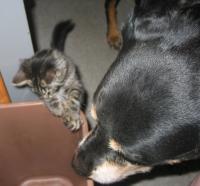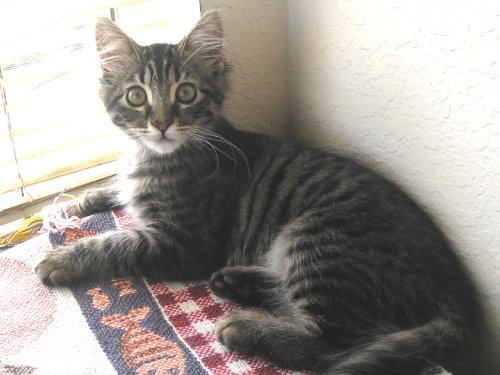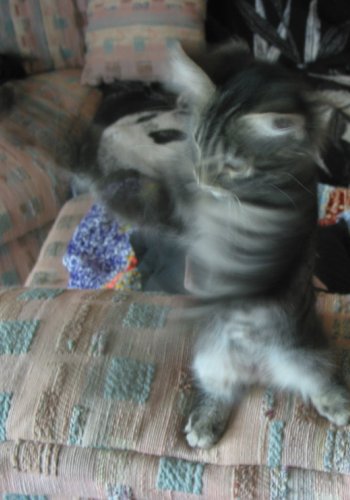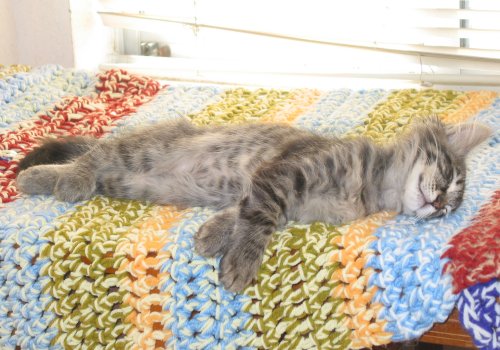February 6, 2009
It doesn’t seem possible that we can already be one month and six days into 2009. I’ve been posting so infrequently that the blog barely has a pulse. But it is alive I assure you. It’s just been sleeping, dreaming if you will.
It’s raining and stormy today and I’m grateful for that. I think this is only our fourth big rain of the season so far. My cat Tara had a bath a few days ago on a warm, sunny, dry day that got to 80 degrees and seems to have become typical weather this winter. At least it’s been easy on the heating bill. Not so easy on the water bill or my sinuses.
I’ve been away from blogs except to post my ramblings about Tarot at Spirit Blooms. I’ve worked off-line at my other computer on artwork, read or posted on a couple of favorite Internet forums (more than I should), and searched out alternatives on- and off-line to spending money that I don’t have on books that I dearly want. I started out reading about Carl Gustav Jung; now I’m reading the writings of Jung himself, beginning with his autobiography written late in life, Memories, Dreams, Reflections . Still deep in my J. R. R. Tolkien adventure, I recently finished reading The Annotated Hobbit, and now I’m savoring The Lord of the Rings. I’m a little shocked by how much watching the movies in the interim has botched my memory of the original story. Still they’re excellent movies. One should appreciate each on its own merits, the novel and the movies as separate creative entities. To do the written story complete justice there would’ve had to be nine or more movies instead of three. Not that I would complain, but not everyone is the Tolkien fiend that I am. Up ahead I plan to continue with The Silmarillion
. Still deep in my J. R. R. Tolkien adventure, I recently finished reading The Annotated Hobbit, and now I’m savoring The Lord of the Rings. I’m a little shocked by how much watching the movies in the interim has botched my memory of the original story. Still they’re excellent movies. One should appreciate each on its own merits, the novel and the movies as separate creative entities. To do the written story complete justice there would’ve had to be nine or more movies instead of three. Not that I would complain, but not everyone is the Tolkien fiend that I am. Up ahead I plan to continue with The Silmarillion and The Children of Hurin. Perhaps others, who knows? I’m taking my time, reading mostly late in the evening before sleep, if I’m not too tired by then.
and The Children of Hurin. Perhaps others, who knows? I’m taking my time, reading mostly late in the evening before sleep, if I’m not too tired by then.
Eric Mayer mentioned, in his comment on my earlier post about rereading favorites, that he almost never rereads books. I’ve been the same way most of my adult life. I reread a lot when I was a teen and young adult, but at some point I realized there was plenty in print to read the first time around, and life was short. I felt that I’d miss out on too many other things if I spent my time rereading favorites.
I’ve changed my attitude about that again only recently. This has to do partly with some of the newer fiction that I’ve been dissatisfied with, partly with my budget, and partly with the tiny library here in town where the tastes of the librarians don’t seem to mesh with my own — or I’m just quirky in my reading tastes. I’m sure they have some Tolkien and maybe some Jung, but I’ve come to prefer to take my time and not feel constrained by a return date anyway. I tried writing reviews here for a while, and I found that if the book was a library book I had to return it too quickly, and if I tried to write a review after that, I kept wanting to refer to the book. If I like it, I want it to stay around for a while. I also tried our library’s on-line interconnection with an ebook download system, but that didn’t work for me. Old computer or aging human brain inside user? Either way it didn’t work and I didn’t want to waste time fussing with it. I wanted to read the book. You know, just open a cover and start reading. If something is going to slow me down I want it to be the savor of words.
That brings me to the fourth reason I’ve gotten back into rereading. Mostly it has to do with wanting to read slowly. I’ve given up on reading everything out there. I’ve finally accepted that’s impossible. I’ve decided to hone down my reading list and read what I love — slowly, and as many times as I want.
When I reread an old favorite I don’t have to be in such a hurry to get to the end. I already know how it ends. There is something to the first bloom of a new story, that first time through when it’s a path of discovery, recognition, and suspense. But this time I can pause and enjoy the language along the way, let the suspense build again slowly. My old favorites have language worth pausing for. The more commercial books today tend to be heavy on suspense and bizarre plots and twists, while they seem too often short on the kind of writing I savor. Many feel to me as if they’re written in too much of a hurry, or as if the writer didn’t even like the story he was writing. The secret to great writing, I think, is for the writer to so love the story that he’s reluctant to leave it. Chances are the reader won’t want to leave it either.
But then I’m not a hurrier, never have been. I think it’s too easy to get into an “I’ll miss something if I slow down” mindset in our day and age, though it’s a valid concern to some degree. In the work world, one must hurry enough to show up when needed, and if one slows down one is in danger of not getting important work done, of missing opportunities, or of not being able to do one’s job anymore because one hasn’t kept up with hyperactive technology. There are sometimes valid reasons to hurry. I don’t want the emergency room team to dawdle, or firefighters to take their time arriving at a fire. For readers who want to keep up, there’s such a huge amount being published, in spite of aspiring writers’ concerns that no one is publishing what they write, that it’s easy to think one has no time to reread or to read slowly the first time. There are also such a great number of people who want to be writers that it doesn’t appear we’ll ever have a shortage of reading material, even very good reading material leaving out the bad. It’s a crowded world full of people with something to say, many of them excellent writers.
Still I think we miss out on too much by trying to do or read everything. I’m not well-read, mainly because I’m a slow reader. Maybe that’s why I appreciate books that take a long time to produce. I can sense the love and time that was put into them. I can linger, relish, and wonder why. I can spend a relatively equal time enjoying them, and feel gratitude that the authors took the time to do it right.
Tolkien took something like 13 years to write The Lord of the Rings between 1937 and 1949. He took longer, when one considers all the thought prior to beginning it that he put into creating the world of Middle-Earth, from the time he was a boy, and the time between 1949 and 1954 that he worked with his publisher to get everything just right. That time shows. And it’s not as if by taking that long he missed out on sales, which seem these days so unforgiving of anyone lagging behind. The only time any of his books went out of print was during Word War II and the after-war years, when paper was rationed in England. Oh, and there was the problem of some proofs being destroyed in a bombing or a fire (I don’t remember which) that caused further delay in getting one edition of The Hobbit back into print. Of course one important factor in his print longevity was in being Tolkien. There have been many imitators and, as Eric seemed to hint in his comment, most imitations have not held up very well. Time is, I think, one reason.
I’m certain that the biggest problems with many books is that they’re devised and written in too much of a hurry, and because they aren’t true to the writer’s own creative promptings. I can see some publisher urging a writer to create something like Tolkien wrote, but to do it right now. Imitation done in a hurry can rarely hold up to the proper process of creation. Sometimes, but not usually. Imitation as a whole is an iffy and questionable practice. Readers may say they want another story like The Lord of the Rings, but they’re not saying they want an imitation. They want more Tolkien, and that’s simply the best possible compliment to the original creator, not to any would-be imitator. Perhaps we sometimes, as readers, make the mistake of confusing the two ideas ourselves and go looking for another Tolkien when we should be looking for something else that’s new and fresh, and over which someone labored long and lovingly.
It’s been said that most of a writer’s work doesn’t take place at the typewriter or keyboard, or even necessarily with paper in hand. It happens inside the mind of the writer. I personally think every writer’s workspace needs a comfy couch, or a bed, and a window with a view of a natural setting or garden, as well as an immense library. I also think it’s safe to say that most great fiction writers have lived what they write. By that I don’t mean they’ve experienced it in physical reality. I mean they have a fertile and active imagination, an ability to visualize the experiences they haven’t actually lived. A relentless imagination at that. We use our imaginations to read, but the writer uses his imagination far more, over and over again, actively reliving the scenes he writes in his mind, working them out until they feel right, until he’s ready to translate them into written language. They get to know their own unconscious realms and facets of their own characters, as well as the archetypes of the collective unconscious, even more than we do ordinarily when we dream at night.
Now I know that some writers create at the keyboard on the fly. I’ve done that too. But the stories I’ve written that I felt best about were usually those that I had in mind for a long time before I dared to put any words down. They were an integrated collection of many things that occurred to me, including some fantasies, day dreams, things I wondered about, and even whole scenes, characters, or settings that occupied my mind well before I realized they’d formed anything close to a story worth sharing or writing down. Some were ideas I couldn’t put away because they begged to be told.
Fast writing may be part of the problem. I once rewrote a novel (Snow Angels) in the course of a few weeks, retyped the whole thing from scratch, from my head. But that story had been in my mind for a long time, in various forms, and even on paper in a few forms, before I did that. I’ve never taken part in NaNoWriMo, but I think it is possible for it to produce something of value, provided there’s something already percolating in the writer’s mind before they begin, perhaps for years before they begin typing it out. I’ve done fast writing exercises, and I know they have their value. But I wonder if the trend in fast writing is the reason so many new books I read leave me flat these days.
There is fast writing that’s great, and there have been many great prolific writers. But if we make the mistake of thinking their greatness lay in their proliferation, we do them a disservice. The secret to great writing also doesn’t lie in taking forever to produce something. I’m sure there are plenty of slowly written pieces of rubbish passing for fiction. But prolific writers are the exceptions to the slow writing rule, I think, and like Mozart’s music, great fast writing is great for other reasons than its speed of production or lack of revision. Of course everyone should write at their own speed, but fast writing of a single draft usually requires slow thinking up front, and long, slow revisions afterward. If one doesn’t take the time to do it right, to follow through, to consider it worth some effort, then even that smaller portion of fast writing time is wasted, not to mention the time anyone else takes to read the result. If it’s not worth spending lots of time writing, then maybe it’s not worth reading either.
In spite of how long Tolkien’s work has remained in print, it’s still possible that work of this kind is best done for oneself, with any idea or intent of publishing as a mere afterthought. One should, after all, consider oneself worth writing well and respectfully for. From what I understand of Tolkien, he only shared what he created with a few colleagues, friends, and his children, until the friend of a friend mentioned the possibility of publishing The Hobbit. Maybe that’s why it’s so good. He took time to shape and polish it to be what he wanted for himself and those he loved. Only after that did he shape and polish it for publication. Surely that provided him a great deal of satisfaction in what he wrote, regardless of whether strangers in his own land or across the pond liked it later on. He was also a real-life expert regarding myths of a world similar to the one he created and regarding the language he used to create it. But was he an expert who happened to come up with a story he was best suited to write, or was he a writer in the making, even as a child, who lived in his head creating a world first and who worked all his life to become expert at just what he needed to recreate that world on paper? Either way, he took his loving time about it, and that’s a good thing for all of us. After all, what’s the rush?
— Barbara @ 1:55 pm PST, 02/06/09
October 16, 2008
It’s dry here, desert dry, with humidity in the teens. When it’s hot and dry like this, black widow spiders come out to catch droplets of water from the hose, as the sprinkles shift strands of their webs in the rock wall in the lower back yard.
The other night, a few miles away, people were evacuated because of a brush fire threatening homes, an untimely reminder of last October and our four-day evacuation. I slept lightly, when I slept at all that night, worried we’d get a reverse 911 call, should the Santa Ana winds shift. Now that fire is well contained, and the sky is blue. Yesterday some high, wispy clouds stretched thin feathers across it, so high up we didn’t feel any moisture from them. At least they were pretty to look at.
The cat keeps getting charged up with static electricity when she plays. Then she touches me, gets a shock, and thinks I’m being unreasonable. But she’s a forgiving soul. As soon as the air conditioner chills her, she decides some lap time might be in order. Tara’s coat, which has fluffed out again after a few months in which we thought she’d grow up to be a shorter haired cat, now suffers from static cling, crackling close to her body as I stroke it. Her glorious, bushy tail picks up everything. It’s better than a feather duster.
Last night she cozied up to Barack Obama during the debate. I had the little desktop TV on, and she sat right in front of him, blocking my view, gently patting his face now and then. She completely ignored John McCain. I think Tara has cast her vote.
I’m still inner focused and in reading mode, sometimes online, sometimes in books. As soon as I post this, I’m off to read some more. Someone let me know when autumn starts for real around here. In my experience that’s around Halloween, so maybe my “autumn’s here” notice will be a knock on the door by little goblins.
I would be envious of people like Marion who are expecting snow soon, if I didn’t realize how many months of it she’s in for, away up there in Canada. Extreme weather for months and months — or just weather that’s too extreme, period — isn’t fun, at either end of the spectrum. I wish us all longer, gentler autumns and longer, gentler springs.
Kitten pictures follow. (Click on thumbnails to view larger images.)
The first two are from 3 months ago, when Tara was 3-1/2 months old and Indi was still with us — um, training her? Apparently they didn’t find anything good in the trash that time. In the second one, that was my clothing Miss Bigfoot was digging her claws into with the look on her face that said, “Gotcha!” She’s usually gentle with her claws when playing now, though she has yet to completely understand about not biting. Maybe when she’s finished teething in another month and a half. She’s gradually getting gentler altogether when we play, because she knows if she gets too rough, playtime ends, and she would prefer that it never, ever end.


The next two are from yesterday, at 6-1/2 months. I caught Tara in a quiet moment lounging on an office chair that she’s not really supposed to be on, but I’m just happy if she doesn’t claw it. The first shows a glimpse of her fluffy tail.


She’s starting to settle down, except for her desire to climb every mountain, which involves knocking things off high shelves. I have most of my breakables put away safely now, so if she doesn’t kill herself dragging a heavy, blunt object onto her own head, we’re all safe.
— Barbara @ 3:22 pm PST, 10/16/08
July 11, 2008
Then my computer crashed for a couple of days. Here they finally are:
Tara at nearly 15 weeks and 3.5 lbs, in a rare moment when she’s sitting still —

Tara as a blur (her normal state) —

The first tomato? We’ll see.

In case anyone is thinking that my fresh interest in gardening means I have a lush, fully planted yard, I have to confess here that these photos are a cheat. They don’t show the ground still barren of any planting. We live on a granite hill, partly decomposed and partly still-composed boulders. We also live in a semi-arid, overly populated part of the country, so water isn’t cheap. I’m also lazy. I’ve planted around what my husband already planted or nursed back to health, and that might make me appear to be a more productive gardener than I am. But I love my few plants, they’re producing, and I have big plans for next year, so we’ll see.


As you might have guessed, part of my garden is for the birds, though I like sunflower seeds too, so even the sunflowers aren’t entirely for the birds.
I’ve read somewhere that there’s a German paper company that makes fine stationery from sunflower stalk fibers, and that gets an artsy-craftsy person like me thinking. . . .


Of the seven or so sunflowers growing in our yard right now, most face east, most of the time. There’s one near the front door that faces the door, to its north, which means I see its shining face as soon as I walk outside. It’s had the same ladybug on its bloom (below) for three or four days now. I hope she’s taken up residence and plans to take care of it and keep it pest free until it’s finished blooming.

Then there’s this one (below), which faces the southeast (back) corner of the yard. Is it an errant sunflower that thinks it has to stand in the corner — my generation’s equivalent of a time-out? Or does it like the chattering of the caged parakeet the neighbors down there sometimes leave out on their patio during the day? Maybe it’s made friends with the bougainvillea. I don’t know.

I almost forgot one of my favorites, a picture of the quintessential Tara — at least when she’s mellow and not stalking whatever prey or toy or window screen is available to do her destructo-cat number on. This is from two weeks ago when she still had a little kitten fluff —

— Barbara @ 9:13 pm PST, 07/11/08
November 22, 2007
We have holidays for a reason, and every culture in the world has had them. But sometimes we need to take a look at our reasons for celebrating, and exactly what it is that matters. We need a way to mark the passage of the seasons, to remind ourselves with lessons from the past why we have reason to celebrate, to review our mistakes as well as our blessings.
When I woke up this morning, I couldn’t stop thinking about this song that I learned as a kid for Thanksgiving: (more…)
— Barbara @ 2:22 pm PST, 11/22/07
October 22, 2007
Yesterday felt like a rerun of my birthday four years ago when I spent the day worrying about a fire at nearby Camp Pendleton. That year the wind changed to a Santa Ana, carrying that fire away from us. But a few days later the Cedar Fire started, and burned 280,278 acres, 2,820 buildings (including 2,232 homes), and killed 15 people. About a year and a half before that was the Gavilan Fire, which came within 1/2 mile of my home.
When I was a kid I thought Santa Ana winds were sort of exciting, though even then I didn’t like the heat that came with them, or the dry air that made my hair crackle and my skin feel like paper. But now, after so many fires and worries, I’d rather be out of town when this weather kicks in. The humidity was in the single digits all day yesterday, and it’s every bit as dry today. I slept very little last night, spending most of it listening to the wind tear around the house, creaking the walls and whipping things around outside, and wondering whether all of Ramona (36,000 population) and all of Potrero got evacuated, and how far the fires would spread during the night and all that wind.
This morning I woke to a phone call from my sister, who’d heard on the news that there was a fire in Rainbow, about 5 to 10 miles from me. So today is a fire watch day, hoping the wind will settle down, hoping the air will moisten, and hoping our firefighters aren’t stretched too thin.
I turned 51 yesterday. I think I’m getting too old for this.
— Barbara @ 10:14 am PST, 10/22/07
August 1, 2007

According to my old bird guides, one of which dates back to a field biology class I took at eighteen or nineteen, this little guy isn’t supposed to be here. He’s supposed to be anywhere from Northern California to Alaska. But here he is, in Southern California. (Notice how we Californians capitalize the two regions, as if we wanted to be two separate states, like the Dakotas or the Carolinas?)
Anyway, he’s in the wrong place, I think. If it’s time for Rufous Hummingbirds to migrate to winter grounds, he’s supposed to be in Mexico, or on his way there. This feisty little Selasphorus rufus has claimed the territory around our feeder during the past two days. I’ve been paying attention to hummingbirds all my life, and we’ve fed them for years, here at the north end of the county and in the city of San Diego, but we never saw a Rufous before, at least not closely enough to identify it. With no green on his back (see below), he’s definitely a Rufous.


My photos don’t do him justice, though they might if he would sit still for a few seconds and let me focus. He’s a glowing reddish gold with an irridescent scarlet throat that could stop traffic. He’s faster than any of the other hummingbirds, and he doesn’t let them forget it.
Maybe his range has been thrown off by global warming, as this Smithsonian site seems to hint, or perhaps they’ve always been around and I just haven’t noticed.




— Barbara @ 6:12 pm PST, 08/01/07
July 5, 2007
I decided to answer your comments in a new post, since some of my responses are lengthy. You’ve given me a lot to think about and helped me reconsider my feelings about critiques. Even though I disagree with some points, as they relate to my writing at this time, you all shared wisdom that deserves attention. (more…)
— Barbara @ 7:33 pm PST, 07/05/07
May 16, 2007
I’ve never been much for reading or watching the news, especially when I was younger. I used to catch criticism for not doing the grownup thing — watching the news or reading the paper as much as everyone else did. I managed to keep up with most of the important news, but I noticed early on that the news upset me, a lot. It got me worked up about things beyond my control, and raised my overall fear and frustration level, without giving me all the facts, or any resolution. It’s possible this news avoidance started when I had a brother serving in Vietnam and saw war news every night during the dinner hour. Maybe it began even earlier. But those negative side effects of the news stayed with me and seemed to outweigh or play down the benefits of keeping up with every little thing presented as news. (more…)
— Barbara @ 8:14 pm PST, 05/16/07
April 13, 2007
Has it been more than a week already since I posted? I lost track of time during my panic of the past few days. The other night, after a glitch occurred when I ran my backup program, I thought I’d lost all my files for my current book in progress. Panic ensued, while I scrambled to find and undelete the files. I spent almost 24 hours straight on that, with little sleep, piecing together fragmented files, hoping I still had a complete book there. Finally I came across the directory on the backup computer where my backup program had stored a complete second archive of everything — perfectly intact and up to date, including every last minute of my work on the book.
All that panic because I was too dumb to know my backup program stored an archive of deleted files, and because I had allowed too much other garbage to backlog on my hard drive. (The glitch occurred when that particular hard drive filled up.)
I could sit here and ask why me, or rather ask why I do this to myself, but I’m too busy getting back to normal and on with work. Still, it seems that I go through this sort of panic on a regular basis. It happened two years ago when my old laptop gave out and I lost work that I hadn’t yet backed up. This time it resulted from the backup process itself.
Once I’m finished with this book and it’s off getting a look by some agents, I plan to spend a few weeks getting my life in better order, including both paper and digital files, to prevent future panic episodes.
But one thing I noticed during all of this was that I don’t tend to print out what I’ve written as often as I used to. In spite of what might’ve been lost, overall I consider that a good thing, a good sign that I’m making my personal transition from paper to a digital world.
I admit to some affection for the paper world. It’s what I grew up with, and where I found my love of books and the written word. There is still something sensual to me about the feeling of pen and paper or a book in my hands. I like the shape of the book, the weight of it, the toothy or smooth texture of paper, even the smell of ink, paper, and binding materials. I still recall with nostalgia the particular smell of the book I was handed in third or fourth grade when we studied the culture and geography of Japan. Ever since, I’ve looked for similar qualities each time I open a new book. All these things make letting go of the paper world a clingy process.
At the same time, I love trees. Because of that, I’ve always been troubled that my chosen form of expression — writing — has a history of felling so many trees. So when I went through my computer files and some paper files over the past few days, I was pleased to realize that I recently have less tendency to print as I write. I used to feel a need to print out what I’d written more frequently, to edit or proofread on paper rather than onscreen, or just to get a sense of what the printed story would look like.
Maybe it’s so many years of writing on a computer that’s changed this. Maybe it’s the laptop’s portability and reduced glare being easier on my eyes. Maybe it’s no longer having a job that requires me to stare at a screen all day and then do the same all my evenings and weekends for my fiction writing.
Maybe it’s blogging. The immediacy of blogging tends to encourage me to edit onscreen. My blog is even set up now so I can view what I write in two or three different fonts before I post it, which I think aids the onscreen editing and proofreading process.
Maybe it’s a combination of all those factors. It’s interesting to note that more publishing venues have opened up to electronic submissions just since the CRT monitor has begun to vanish. Hopefully the less glaring monitors that are replacing them will be much easier on all our eyes, and continue to save more trees.
I still write a good half of my personal journal pages by hand, and I still use handwriting to jump-start or unblock my writing process. This blog post is in fact a segue from my morning pages. But my journal pages don’t get reproduced, except by typing them into a digital format, and they’re unlikely ever to be published in book form. The paper is eventually recycled if they do become digital, so I’m not as concerned about my journal pages killing trees. At least that’s what I like to tell myself.
Now if we can get the ebook technology to the point where fewer paper books have to be printed, at least for popular fiction, then we’ll have made real progress in taking publishing from deforestation for profit to a more pure form of edification, expression, and entertainment. Of course there will always be uses for paper. I can’t think of a better way to keep certain legal documents or accounting records, right now, though that’s not a world I work or have much expertise in. There are also some types of books that just work better, for now, on paper. One that comes to mind is the coffee table variety, with color plates of artwork or photography. But the less trees cut down for paper and books, the better.
Even if what this Guardian Unlimited article says is true, that planting more trees in temperate latitudes won’t help assuage global warming, it also states that destroying more trees isn’t the answer, that the greater need, and indeed our motivation for attempting to slow global warming, is to preserve ecosystems, including but certainly not limited to our own.
Perhaps my panic over my files had some value. It got me not only to change what I file away on my computer and how I back it up, but also to take a hard look at how I use paper, to keep heading along the road I’ve started down, of conserving wherever it’s reasonable, and wherever I can.
— Barbara @ 2:16 pm PST, 04/13/07
March 14, 2007
I’ve been struggling for topics to blog about, but surely there can be no more chilling thought for a writer than people not wanting books even when they’re free. Someone posted, on a mystery mailing list I belong to, that she boxed up what I’ll presume were mystery novels, and placed them out in front of her home, labeled as free . . . and had no takers. This was in a small university town.
The story surprises me, because in our former neighborhood, where our back yard faced a community college parking lot, we had excellent luck putting things out in the driveway for free, including boxes of used books. Sometimes people took entire boxes rather than a book or two. Nearly everything we put out found a home, including an old sofa we’d acquired already well-used, which I was certain we’d wind up hauling to the dump. Ours wasn’t a busy street except during classes, when students parked there, so I have to assume it was sometimes students who took those items. Then again, my experience with that was ten years ago. Now everyone I see walking around has a cell phone stuck to one ear, and I’m lucky if they avoid colliding with me. Maybe they wouldn’t SEE the books, even with a big sign.
When I was a student, I would’ve browsed through any box of free books on offer, even though I had plenty of other reading that I should be doing instead, for school. My grandmother used to say that no one in our family could clean an attic, because we’d stop to read everything. (That was before bubble wrap, when we used newspaper to wrap fragile items.)
Which reminds me, I dreamed just last night about the car I drove as a student. I hadn’t thought about that car in years. It was a white 1964 Mercury Comet that had a lot of miles on it before I got it. The dream was a mini-nightmare, not because I found myself in that car, but because this creepy guy who’d just followed me out of a bank removed what I thought was a disguise — a wig, under which he had a shaved head — then tried to get me to give him a ride. I was suspicious of him, so first I told him that if I did that my dad would kill me. (I must’ve been a teenager in the dream, which explains the car.) He argued with me, but I got into my car and locked the doors. It isn’t the sort of dream that usually qualifies as a nightmare for me, but it woke me up, heart racing.
That first car had some real-life nightmarish qualities. One was its tendency to overheat if I drove it to a higher altitude. I love the mountains, so not being able to drive my first car to the mountains without it overheating frustrated me no end. As the car aged, it developed other idiosyncrasies. I think my dad and I were at one point the only two people on earth who knew how to start it, which involved pumping the gas pedal just the right number of times, then holding it down . . . oh well, I don’t remember the sequence now. It had other problems too, and I have to wonder now at my desire to drive the thing, but when you’re young I guess you just want to go. You don’t care what you put up with to do it.
That car’s most nightmarish problem was the front passenger door’s sticky latch. My parents paid for my gasoline on the condition that I drive my grandmother anywhere she wanted to go. One day the door didn’t catch, and it flew open when I made a turn. Grandma didn’t fall out, but that incident qualifies as more nightmarish than the dream that ratcheted up my heart rate last night.
What about you?
Do you rummage through boxes of free books whenever you see them?
What was your first car like?
Do different things scare you in dreams than in real life?
— Barbara @ 10:38 pm PST, 03/14/07
![]() . Still deep in my J. R. R. Tolkien adventure, I recently finished reading The Annotated Hobbit, and now I’m savoring The Lord of the Rings. I’m a little shocked by how much watching the movies in the interim has botched my memory of the original story. Still they’re excellent movies. One should appreciate each on its own merits, the novel and the movies as separate creative entities. To do the written story complete justice there would’ve had to be nine or more movies instead of three. Not that I would complain, but not everyone is the Tolkien fiend that I am. Up ahead I plan to continue with The Silmarillion
. Still deep in my J. R. R. Tolkien adventure, I recently finished reading The Annotated Hobbit, and now I’m savoring The Lord of the Rings. I’m a little shocked by how much watching the movies in the interim has botched my memory of the original story. Still they’re excellent movies. One should appreciate each on its own merits, the novel and the movies as separate creative entities. To do the written story complete justice there would’ve had to be nine or more movies instead of three. Not that I would complain, but not everyone is the Tolkien fiend that I am. Up ahead I plan to continue with The Silmarillion![]() and The Children of Hurin. Perhaps others, who knows? I’m taking my time, reading mostly late in the evening before sleep, if I’m not too tired by then.
and The Children of Hurin. Perhaps others, who knows? I’m taking my time, reading mostly late in the evening before sleep, if I’m not too tired by then.






















